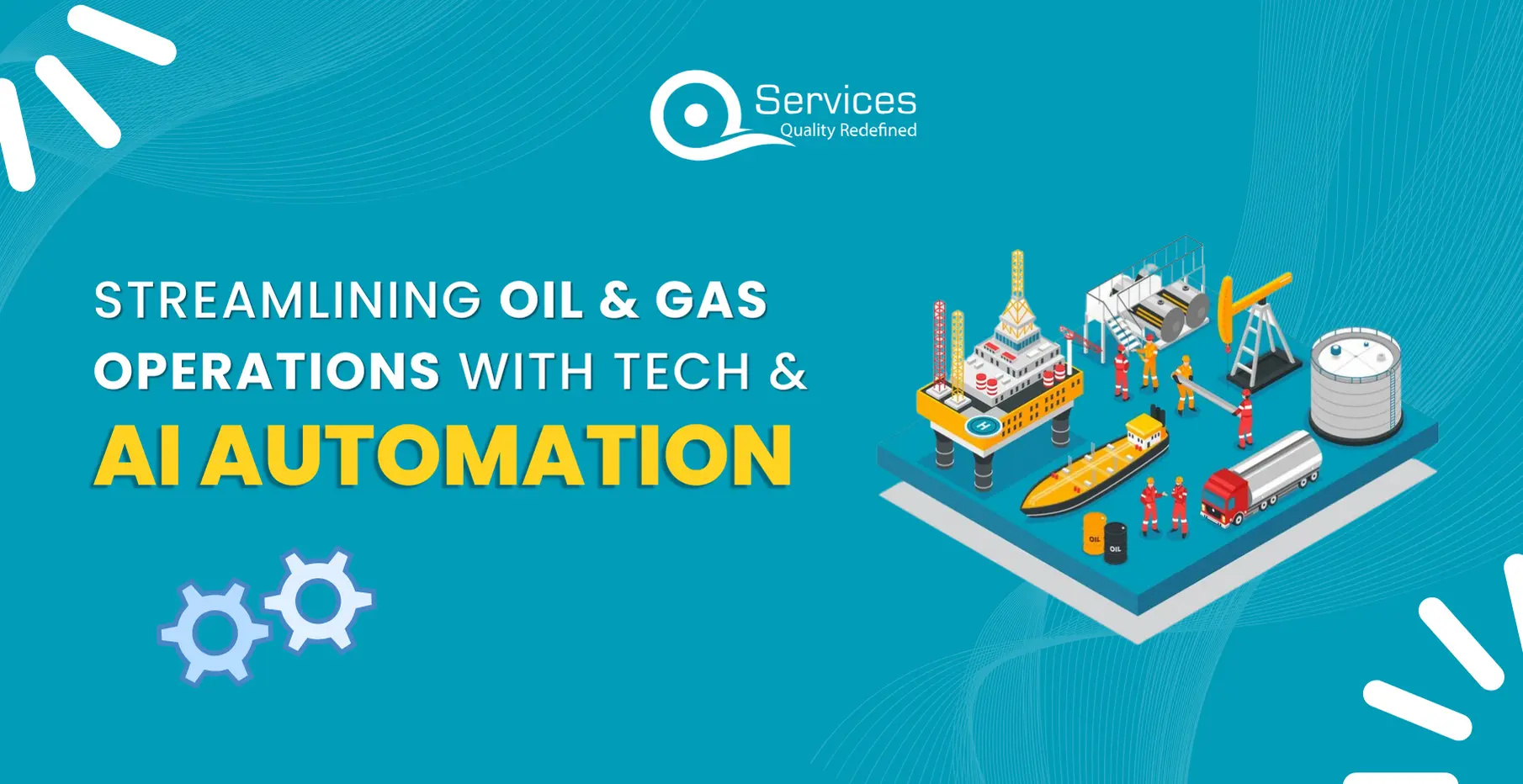Home » AI in Oil and Gas:How to Streamline Oil and Gas Operations with Technology and AI Automation?

According to a GlobeNewswire report, the market for AI in the oil and gas industry is projected to reach $4.21 billion in value by 2028, growing at a CAGR of 12.09%. Artificial intelligence is revolutionising how businesses work in the oil and gas sector because of its capacity to analyse large datasets and get insights from trends. AI and digital innovation are propelling automation to transform the intricate operations of exploration, extraction, and distribution. This change signifies a radical reinterpretation, simplification, and security of complex processes. Predictive maintenance, efficient supply chains, and improved safety standards have replaced labour-intensive employment, which is a thing of the past. The oil and gas industry is evolving, adopting a tech-driven future that fundamentally redefines how this important sector operates while keeping the lights on.
Automation is the application of technology in a way that require little or no human involvement. It entails the development and implementation of machines, systems, or other devices that can carry out tasks automatically. Aims to improve precision, efficiency, and human effort across a variety of tasks. It enables repetitive or difficult operations to be carried out reliably, consistently, and frequently more quickly than human counterparts, improving productivity across a variety of industries. Automation uses preprogrammed instructions and modern technology.
Get free Consultation and let us know your project idea to turn into an amazing digital product.
Oil and gas automation, utilising artificial intelligence (AI), involves deploying advanced algorithms and computer systems to enhance and automate specific business procedures traditionally performed by humans. This strategic integration aims to streamline processes, reduce costs, bolster safety measures, and foster sustainability in the oil and gas industry through the judicious application of technology.
The primary objectives of AI automation in this context are to streamline processes, reduce costs, bolster safety measures, and foster sustainability through the judicious application of technology. This strategic integration of AI not only redefines operational paradigms but also represents a concerted effort to propel the industry into a more efficient, cost-effective, and technologically advanced era.
Streamlining oil and gas operations with technology and AI automation, including innovative solutions, is crucial for achieving operational efficiency and optimizing processes in the industry. Here are key strategies, incorporating AI in oil and gas exploration, to propel this transformation:
Artificial intelligence in the oil and gas industry transforms strategic decision-making through the emergence of AI-powered demand forecasting. By meticulously analyzing extensive datasets that encompass historical performance, prevailing market trends, and geopolitical nuances, AI brings forth a nuanced understanding of demand patterns. This intricate analysis empowers industry leaders within the oil and gas sector to make well-informed decisions, strategically allocating resources with precision. Given the significant impact of market fluctuations and geopolitical events on operations, AI’s forecasting capabilities act as a compass, guiding companies to optimize resource allocation. This ensures operational efficiency, mitigates risks, and enhances overall profitability in the face of ever-evolving industry dynamics.
The oil and gas industry is experiencing a revolution in asset management as AI takes over as the leading intelligence navigating the complexity of priceless assets. AI enables businesses to detect and handle possible issues using predictive analytics, coordinating proactive maintenance to save downtime. As resources are dynamically allocated, asset performance is optimised for increased productivity and profitability, showcasing its efficiency. To rigorously analyse risks and reduce failures in the face of market uncertainties, AI serves as a strategic shield. It manages a smooth transition from purchase to delivery while integrating supply chain optimisation to provide adaptation to real-time changes. In a sector where assets are crucial, AI emerges as the driving force, guiding businesses towards not just survival but also success in the oil and gas industry’s always changing environment.
Gone are the days of reactive responses to unforeseen breakdowns in the oil and gas industry. The integration of AI and IoT in oil and gas industry, empowering enterprises to strategically schedule maintenance activities and identify potential issues before they result in failure. This proactive approach not only prevents costly downtime but also optimizes operational efficiency, ensuring seamless functionality across the intricate machinery. In a sector where reliability is synonymous with success, the synergy of AI and IoT in predictive maintenance emerges as a crucial partner. This dynamic duo enhances equipment longevity, minimizes operational disruptions, and contributes significantly to the industry’s overall resilience and sustainability. The integration of AI and IoT in the oil and gas sector is bringing about a fundamental shift towards maintenance practices that are more efficient and proactive.
The integration of AI into oil and gas exploration emerges as a game-changer, revolutionizing key facets of the industry. From reservoir characterization to drilling optimization, production efficiency, and environmental sustainability, AI and ML technologies showcase their efficiency in transforming challenges into opportunities. The precision and predictive capabilities of these systems not only enhance decision-making but also contribute significantly to cost reduction, operational efficiency, and overall safety standards. As the industry navigates towards a sustainable future, AI proves to be a crucial source, providing invaluable insights, mitigating risks, and paving the way for responsible and efficient practices.
The use of AI in the oil and gas sector is essential for overcoming the difficulties posed by price variations. Large databases, historical pricing information, and market trends are all examined by AI systems using sophisticated data analytics and predictive modelling. This makes it possible for businesses to predict changes in the price of oil quite precisely. Organisations can develop proactive strategies to hedge holdings, optimise production, and make wise decisions in reaction to market dynamics by using data-driven insights. Companies can quickly adjust to unexpected changes thanks to AI’s real-time analysis capabilities, which automate trade choices and ensure minimal human involvement. AI is giving the sector the tools it needs to profit from favourable market conditions as well as weather price swings, ultimately increasing industrial resilience and profitability.
AI, automation, and technology dramatically improve safety measures in the oil and gas industry. Continuous equipment performance and health monitoring are key components of AI-powered predictive maintenance. Data is analysed by AI algorithms to find anomalies and probable breakdowns before they become a safety threat. By replacing components before they fail and scheduling proactive maintenance, businesses may lower the chance of accidents and provide employees with a safer working environment.
Additionally, AI-powered sensors that track ambient conditions, equipment performance, and worker activity during offshore drilling operations offer real-time safety monitoring. The information is immediately analysed, and if any safety deviations are discovered, prompt alarms and corrective actions are initiated.
Robotic Process Automation (RPA) is redefining the oil and gas industry by revolutionizing back-office tasks, enhancing efficiency, and ensuring accuracy. The adoption of RPA in tasks like invoice processing and supply chain management brings unparalleled productivity gains. RPA bots efficiently handle repetitive tasks, such as data extraction from invoices, validation, and updating financial records, reducing manual efforts and minimizing errors.
In supply chain management, RPA bots gather and analyze data from various sources, optimizing procurement decisions and maintaining optimal stock levels. The integration of machine learning in oil and gas industry enhances RPA capabilities, allowing bots to learn and adapt to new scenarios over time. This transformative technology streamlines operations, increases productivity, and ensures precise decision-making, ultimately reshaping the oil and gas industry’s approach to back-office tasks with a focus on efficiency and accuracy.
AI, specifically in oil spill detection and response, reshapes the oil and gas industry by revolutionizing environmental protection efforts. AI algorithms analyze satellite imagery, aerial photos, and remote sensing data, enabling early detection of oil spills. This proactive approach facilitates prompt interventions, mitigating the environmental impact and preventing the spread of pollutants. The integration of machine learning (ML) and deep learning (DL) models enhances the accuracy of oil spill detection and monitoring, allowing for faster decision-making and effective hydrocarbon recovery. By applying these techniques to satellite images, AI enables timely disaster response even in remote areas, reducing the harmful chemical components’ contact time with the ecosystem. The intelligent models, trained with historical data, require minimal human interaction and processing time, resulting in minimal environmental damage. AI’s role in oil spill management showcases its transformative impact, making the industry more efficient, responsive, and environmentally responsible.
AI adopts a proactive stance by automating the collection and analysis of extensive datasets, ensuring ongoing and simultaneous oversight of compliance requirements. Leveraging machine learning algorithms, AI rapidly sifts through voluminous documents, extracting pertinent information and flagging potential areas of concern. This not only expedites the compliance process but also heightens accuracy, mitigating the risk of oversights. Furthermore, AI’s predictive prowess extends to risk assessments, facilitating the identification and prevention of potential compliance risks. In an era marked by the swift evolution of the compliance and reputational landscape, the integration of AI into the oil and gas industry ensures a resilient, agile, and responsible approach to regulatory adherence.
The infusion of AI into supply-chain management
announces a transformative era. AI’s prowess shines brightly in optimising transportation routes through route optimisation, meticulously considering real-time factors like traffic conditions and weather. This not only expedites logistical processes but also slashes transportation costs while enhancing overall efficiency.
Moreover, AI employs advanced analytics to identify and cultivate relationships with reliable suppliers. This not only ensures a seamless supply chain but also fosters healthy and enduring partnerships. The integration of technology and intelligent automation in the oil and gas sector, specifically through AI-driven supply chain management, is a game-changer. It brings forth a new paradigm where operations are streamlined, costs are optimised, and decision-making is fortified by data-driven insights.
The real-time adaptability that AI offers in route optimization allows for dynamic adjustments, minimizing delays, and ensuring a timely and cost-effective flow of resources. This level of precision in supplier evaluation leads to not just streamlined procurement processes but also resilience in the face of market fluctuations. In essence, technology automation, propelled by AI, is revolutionizing the oil and gas sector, forging a path towards unparalleled efficiency, cost-effectiveness, and strategic resilience.
In summary, the fusion of technology and artificial intelligence is a revolutionary influence that’s reshaping the entire landscape of the oil and gas industry. From predicting demand to proactive maintenance, bolstering safety, and ensuring compliance, every aspect of the sector is undergoing a significant transformation towards increased efficiency, sustainability, and resilience. As we approach remarkable progress, the industry is propelled forward by strategically including AI-driven solutions, simplifying operational intricacies, optimising costs, and basing decisions on insights derived from data. The journey towards a technologically advanced oil and gas sector promises economic success and also establishes a commitment to responsible and sustainable practices, steering us towards a future that prioritises safety, efficiency, and environmental consciousness. The age of AI automation in oil and gas is here, and its transformative influence serves as a guiding light, leading the industry into a new era of prosperity and advancement.

Content writer

Founder and CEO

Chief Sales Officer
